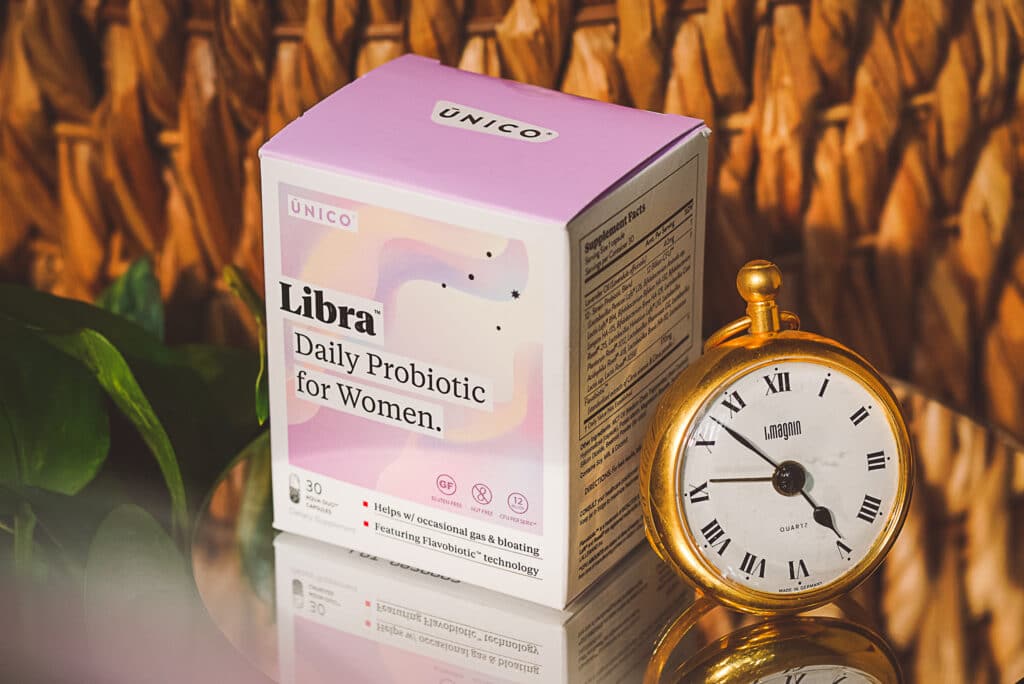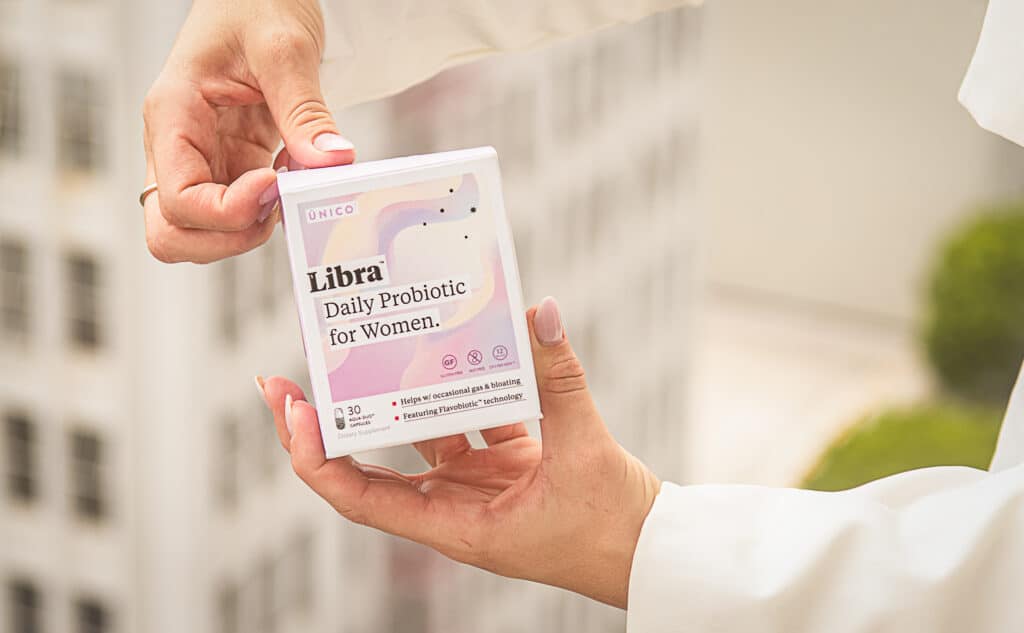You’ve probably heard of probiotics even if you’ve never taken them. Probiotics are widely popular and well-known for improving digestive health, immunity, and overall health. But is there a best time to take probiotics? Let’s find out.

What Are Probiotics Again?
Probiotics are live microorganisms that can improve digestive health by restoring the balance of the gut microflora. They work to keep the gut healthy by preventing the growth of harmful microorganisms and promoting the growth of beneficial bacteria.
Probiotics can be consumed in some foods. If you don’t get a lot of fermented foods in your diet, you may want to consider taking a probiotic dietary supplement.
Why Use Probiotics?
Usually when people think of bacteria, they think of an illness or something they don’t want. There are two kinds of bacteria that can live in your body – “bad” bacteria that can cause illness and infection, and “good” bacteria that ward off “bad” bacteria and maintain/restore balance in your body.
When you get sick, bad bacteria invade your body. This disrupts the balance of the beneficial bacteria that live in your body. When you take antibiotics, they often kill the good bacteria in your body along with the ones that caused the infection. Taking a probiotic can help restore this balance and improve your health.
A healthy balance of good bacteria can improve digestive health, immunity, and reduce inflammation. Healthy bacteria can also:
- Aid in digestion
- Synthesize vitamins
- Aid in metabolism and absorption of medications
- Maintain or restore intestinal mucosa (intestinal cells) integrity to prevent bad bacteria from entering the blood
Researchers are continuously studying probiotics and their effectiveness in improving disease outcomes. There are many possible benefits of taking probiotics, but scientists continue to search for more conclusive answers.
So far, probiotics have shown a potential to positively affect the outcomes of the following conditions:
- Irritable bowel syndrome (IBS)1
- Diarrhea2
- Constipation3
- Yeast infections4
- Gum disease5
- Eczema6
- Lactose intolerance7
A new class of gut-health-boosting compounds called ‘postbiotics’ are especially good at reducing gut inflammation. More about postbiotics here.
Can I Get Probiotics From Food?
Yes, you can increase the amount of probiotics you get from the foods you eat. Some foods have good bacteria, which when eaten can improve your gut health. Most foods that involve fermentation in the production process have probiotics. You may already be eating foods that contain probiotics without even knowing it.
Here are some probiotic-rich foods you can include in your diet:
Foods High in Naturally-Occurring Probiotics:
- Sourdough bread
- Yogurt
- Buttermilk Cottage cheese
- Kombucha
- Tempeh
- Fermented pickles
- Fermented sauerkraut
- Kimchi
- Miso soup
If you find that you aren’t getting many of these foods in your diet, or maybe you don’t like these foods, taking a probiotic supplement is always an option.

Choosing the Right Probiotic Supplement.
There are many different varieties of probiotic supplements, and it can be hard to know which one will work best for you.
Probiotic supplements that come in capsules, beads, or tablets usually survive digestion better8 than other kinds (powders, liquids, foods). Remember, for probiotics to be effective, they have to survive the acidic conditions of the stomach and the digestive process.
Beneficial bacteria strains Lactobacillus, Bifidobacterium, and Enterococci can survive acidic conditions9 better than others. Look for these strains on the ingredients panel of probiotic supplements.
Keep in mind some strains are specialized for certain functions – for example some probiotic strains are best for women specifically.
In addition to the type of bacteria in probiotics, the amount of live and active cultures is important, too. Studies suggest that at least 100 million to 1 billion probiotic bacteria must reach the intestine intact in order to be effective.
To ensure effectiveness, make sure you purchase probiotic supplements from reputable sources. Look for a product that guarantees 1 billion live cultures. This information is usually listed as colony-forming units (CFU) on the ingredients panel or label of the product.
TIP: Consider a brand that contains more than 1 billion CFU from many different beneficial microorganism strains.
Once you have chosen the best probiotic for you, store products according to directions on the package. Some probiotics can be stored at room temperature, while some must be refrigerated.
Is Timing Important?
If you choose to take a probiotics supplement, you may be wondering if you should take them at a specific time. Some products recommend taking them on an empty stomach, and some recommend taking them with food. While there isn’t a ton of conclusive research on the effectiveness of probiotics and timing, let’s explore what’s available and see what the results support:
Digestion of vitamins, minerals, and supplements can sometimes call into question their effectiveness. Some supplements can be destroyed during the digestive process, rendering them potentially useless. In order for probiotic supplements to be effective, they must survive the digestive process and arrive in the gut alive and unharmed. This is the reason we might want to be concerned with timing and whether to take probiotics with or without food.
I’m a Survivor, I’m Gona Make it!
From the research, it appears that different microorganisms survive different circumstances. For example, the beneficial bacteria Saccharomyces boulardii can survive digestion with or without a meal10. Two other beneficial bacteria often included in probiotic supplements, Lactobacillus and Bifidobacterium, appear to do better when taken 30 minutes before a meal11.
Many probiotic supplements contain several different strains of beneficial bacteria to help support gut microflora balance. Due to the different varieties included in one supplement, it would be impossible to cater timing to each individual bacteria’s preference for survival.
One study showed that consistency12 is likely more important than specific timing of consumption.
Another study showed that probiotic supplements can have positive effects13 on gut bacteria regardless of whether they are taken with a meal.
Is There a Best Time of Day to Take Probiotics?
There is not enough scientific evidence to show that probiotic effectiveness changes depending on the actual hour consumed – so no, there is not yet a generally accepted best time of day to take probiotics.
There is not yet a generally-accepted best time of day to take probiotics – what matters is being consistent.
However, what the research does seem to show, is that it is important to be consistent.
Getting into a routine that ensures you take your probiotic every day, preferably at the same time, can potentially increase the effectiveness.
Whether you take it first thing in the morning, with or without food, or before bed, just be sure you take it every day. Studies show that consistency of intake seems to matter more than a ‘best time of day’ for probiotics.
Certain Foods May Enhance Effectiveness.
Companies rigorously study the microorganisms used in probiotics to make sure they can reach the gut unharmed by conditions in the stomach and intestines. Effective probiotic supplements include the highest number of organisms shown to reach the gut intact. These measures help to increase the effectiveness of probiotic supplements.
Some studies show that taking probiotics with certain foods can boost their effects.
Certain foods, such as oatmeal and low-fat milk, appear to increase the survival rate14 of bacteria in probiotics when compared to when taken with water or juice. Researchers believe that taking a probiotic supplement with a small amount of fat can help the microorganisms to survive the digestive process and arrive in the gut unharmed.
However, certain strains of bacteria might survive digestion better when consumed with sugar or carbohydrates. Research shows that Lactobacillus specifically depends on sugar when placed in an acidic environment such as the stomach and digestive tract.
Despite these results, most experts still agree that consistency is more important than timing or type of food.
Summary:
Probiotics are very popular and well-known for improving digestive health and immunity. Many people wonder if they can increase the benefits of taking probiotics by taking them at a certain time of day.
Some research suggests that taking probiotics at a specific time or with certain foods may increase the effectiveness of beneficial bacteria. However, there is no conclusive evidence to support this. Most experts believe that consistency is more important than timing or meal content.
Rather than worrying about a specific time of day, or whether to take your probiotics with or without food, focus on creating a routine you can stick to. Take your probiotic at the same time every day, and never skip a day. Regularity is key when it comes to increasing the effectiveness of probiotics.
Sources:
1https://www.ncbi.nlm.nih.gov/pmc/articles/PMC6769995/
2https://www.ncbi.nlm.nih.gov/pmc/articles/PMC6769995/
3https://www.ncbi.nlm.nih.gov/pmc/articles/PMC6769995/
4https://www.ncbi.nlm.nih.gov/pmc/articles/PMC7023241/
5https://www.ncbi.nlm.nih.gov/pmc/articles/PMC5676329/
6https://www.ncbi.nlm.nih.gov/pmc/articles/PMC6517242/
7https://pubmed.ncbi.nlm.nih.gov/29425071/
8http://ncbi.nlm.nih.gov/pmc/articles/PMC3909163/
9http://ncbi.nlm.nih.gov/pmc/articles/PMC3909163/
10https://pubmed.ncbi.nlm.nih.gov/22146689/
11https://pubmed.ncbi.nlm.nih.gov/22146689/
12https://www.ncbi.nlm.nih.gov/pmc/articles/PMC5403748/
13https://www.ncbi.nlm.nih.gov/pmc/articles/PMC5403748/
14https://pubmed.ncbi.nlm.nih.gov/22146689/
15https://www.ncbi.nlm.nih.gov/pmc/articles/PMC1151822/
Recommended Reading:
- The Best Liquids to Mix Your Protein Powder Into - January 31, 2023
- What is a Caloric Surplus? Plus, Why Your Diet Isn’t Working.. - October 17, 2022
- How Much Protein Do I Need Per Day? A Dietitian’s POV - July 26, 2022
